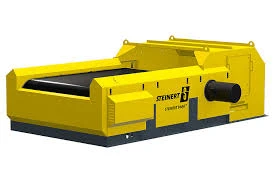

Nën . 28, 2024 14:26 Back to list
The Importance of Metal Recycling Plants in Sustainable Development
In recent years, the increasing demand for metals and rare materials has sparked significant concern regarding environmental sustainability. Metal recycling plants have emerged as a critical component in addressing this issue. These facilities not only help reduce waste but also contribute to the conservation of natural resources and the reduction of greenhouse gas emissions. This article will explore the role of metal recycling plants, their processes, the benefits they provide, and their importance for a sustainable future.
Understanding Metal Recycling
Metal recycling involves the recovery of scrap metal from various sources, including discarded appliances, vehicles, industrial machinery, and construction debris. Once collected, these metals undergo a series of processes that prepare them for reuse. The primary materials recycled include aluminum, copper, lead, steel, and zinc, each of which plays a vital role in numerous industries.
The Process of Metal Recycling
The process of recycling metals typically consists of several stages
1. Collection Scrap metals are collected from various sources, including households, businesses, and industrial sites. Specialized recycling companies often implement programs to facilitate this collection. 2. Sorting Once collected, metals are sorted based on type and quality. This step is crucial because different metals require different recycling processes. For instance, aluminum and steel cannot be mixed due to their varying properties and melting points.
3. Processing The sorted metals are then cleaned and processed. Contaminants such as plastic, rubber, and other non-metal materials are removed. This may involve shredding the metals into smaller pieces for easier handling.
4. Melting The processed metals are melted in furnaces at high temperatures. This phase is critical as it transforms scrap metal back into a molten state, allowing it to be reshaped and reused.
5. Forming Finally, the molten metal is poured into molds to create new products or is rolled out into sheets and coils, ready to be distributed to manufacturers.

Benefits of Metal Recycling Plants
Metal recycling plants provide a multitude of benefits
1. Environmental Protection By recycling metals, we reduce the need for mining new materials, which can be ecologically damaging. Mining activities often lead to habitat destruction, soil erosion, and water pollution. Metal recycling conserves natural resources, significantly lessening environmental impacts.
2. Energy Conservation Recycling metals requires considerably less energy than producing new metals from raw materials. For instance, recycling aluminum saves up to 95% of the energy required to produce aluminum from bauxite ore. This energy efficiency translates to fewer fossil fuels used and lower carbon emissions.
3. Economic Benefits Metal recycling creates jobs, not only in recycling plants but also in collection, sorting, and processing. Additionally, it fosters a circular economy where materials are reused and repurposed, reducing the economic strain of mining and manufacturing new products.
4. Reduction of Landfill Waste With the increasing volume of waste generated globally, metal recycling plays a crucial role in minimizing landfill use. Recycling diverts metals from landfills, which can prevent toxic materials from leaching into the environment.
5. Innovation and Technology Development The demand for more efficient recycling methods has led to innovations in technology and processes, further enhancing the sustainability of metal recovery. Advanced sorting technologies, for example, increase the purity of recycled metals, making them more valuable for manufacturing.
Conclusion
Metal recycling plants are vital for promoting sustainability and protecting the environment. By recovering valuable materials from waste and reducing the need for new resources, these facilities contribute significantly to energy conservation, economic growth, and environmental protection. As society becomes more aware of its ecological footprint, the role of metal recycling plants will only continue to grow in importance. Investing in and supporting these facilities is essential for a greener, more sustainable future. Through collective efforts to improve recycling practices, we can ensure that resources are preserved for generations to come, aligning with the goals of sustainable development and environmental stewardship.
Latest news
The Future of Metal Recycling: Revolutionizing Waste Management
NewsMay.14,2025
Optimizing Waste with Recycling Lines
NewsMay.14,2025
Municipal Solid Waste Sorting Line: Revolutionizing Waste Management
NewsMay.14,2025
Metal Shredders: Essential Tools for Efficient Recycling
NewsMay.14,2025
Maximize Your Profits with a Copper Wire Granulator
NewsMay.14,2025
Home Metal Shredder: A Smart Choice for Your Home Recycling Needs
NewsMay.14,2025